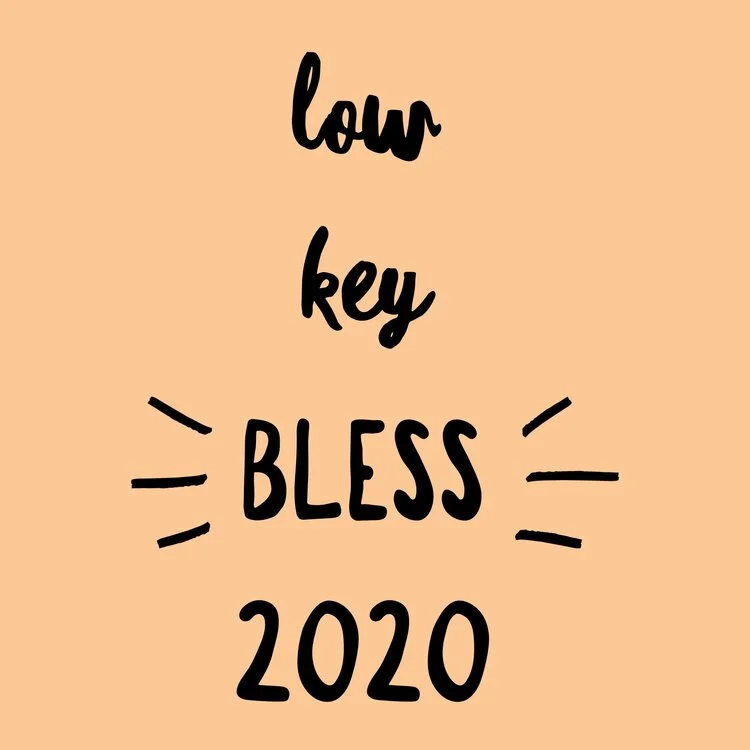Low Key BLESS 2020: Why I don’t curse the year that brought us pain
Have you heard the pop song “Low Key F*** 2020”? (You can probably guess what the “F” represents.) The song by Avenue Beat has gone viral, as the lyrics sum up our communal urge to dismiss this year altogether and to fast forward to 2021. Undeniably, it’s been a rough year: unprecedented wildfires worldwide, an economic tailspin, rioting, looting, demonstrations, a U.S. election year (and all that comes with that), and, last but not least, sickness, death, and the virus that shall not be named.
To be honest, I’m also tempted to say “f*** 2020”. In April, my mother had a stroke and unexpectedly passed away just a few weeks later. Because of virus fears, the hospital had a policy that only one family member was allowed to see her for the duration of her stay. She died alone.
So, yeah, it’s been difficult, all right. For all of us. In addition to losses and disasters, all of our usual outlets have come to a screeching halt. Gatherings with friends/family? Cancelled. Concerts? Cancelled. Church? Boy Scouts? Meals out? Trips? All cancelled. Even work and school have been cancelled for some. Naturally, this makes us want to lash out and cancel 2020, in return — to curse the year by shaking our fist at it or wishing it out of existence.
Disappointment, anger, frustration, and even rage are normal responses to trials and tribulations. There have been days when I’ve broken down and sobbed because of all that’s going down. So, I’m not saying we should ignore our emotions or tamp them down, by any means. It’s important to acknowledge feelings as legitimate. But our emotions do not change the circumstance or improve it in any way. In some respects, they’re reminiscent of the toddler throwing a tantrum in the supermarket when denied a treat or the seven-year old crying because she doesn’t like her haircut and wants her hair glued back on. They feel helpless, frustrated, like victims.
But we have agency. Some things are actually in our control. This is why I suggest a fresh tack for these times. By blessing 2020 instead of cursing it, we empower ourselves and our spirits reap the benefit. What if we choose to welcome what the year is bringing, or at least learn from it, rather than writing it off?
It may sound strange at first, but I’m convinced that a new approach could benefit our hearts, mind, and overall health. And can help us move from the “Why?” of the toddler, to the “What lesson is here for me?” of the adult.
Here are some ideas for why (and how) to bless 2020:
Be present — Let’s be honest, we were all going at 100 miles per hour. Our planners were busting at the seams. Life was becoming a blur and if it weren’t for the picture on our smartphone, we might not even have noticed half of what we experienced. 2020 has given us a collective moment to literally stop and be. The present is a gift that we were all simply rushing by. Now we suddenly have the time to appreciate it. Cooking, enjoying our local park, and game nights with my family — these are all the more precious to me, amidst the swirling chaos. So, let’s savor the now, especially because we don’t know what tomorrow may bring.
Look — Slowing down has given us the chance to actually see. A new-found awareness of who we are individually and corporately is within sight. Looking at our own reactions and attitudes in the midst of what’s happening is a healthy (and, honestly, an occasionally startling) endeavor. What are we afraid of? Why are we angry? Where is the frustration coming from and what is it leading to? Often, we think we have only two options with strong emotions: to dwell in them or dismiss them. But there is yet another way: to observe without judgement. This is a practice I’ve been cultivating in recent years. It has helped me understand myself better. When I see myself as I am, warts and all, it increases my compassion for myself, which I can then more easily extend to others.
Embrace opportunity — It’s tricky to change direction when you’re on the run. Having stopped to be present and see what’s happening, we may detect a possibility that we had overlooked before. This is a moment to re-evaluate priorities. When was the last time we talked to that old friend? Is work fulfilling or boring us to death? Why are we still subscribed to that magazine that makes us feel like we never have enough? When did we last ride that rusty bike in the garage? Getting off the treadmill of the usual obligations offers the chance to switch things up in any aspect of our lives. Nothing is off limits, when you awaken from the stupor of routine. Personally, I’ve decided to drop a side gig I had (and, yes, the money I made with it) to work on a project that will get me closer to my life goals. I may be poorer, but I’m happier now. We can make important changes, thanks to the clarity that comes from removing the inconsequential.
Stillness — The introspection listed above is only possible if we do not numb ourselves by scrolling on social media, binge watching Netflix series, or _______ (insert coping mechanism of choice). It is so tempting to fill the void of activity with something that requires nothing of us (beyond an occasional “like” or “heart”, that is). Deliberately zoning out might be just the ticket from time to time. But we must also dare to be still. Admittedly, this is the hardest one for me. I have to work to make space for quiet. It helps to have a particular time and space to cultivate this habit. I choose to take time before breakfast, before checking my phone or emails, before listening to news or podcasts. It helps set the tone for my day, when I take time to pray, set intentions, and get inspiration from sacred books. In quiet, we can cultivate the confidence and wisdom of mystics, saints, and spiritual giants.
Shift to gratitude — Gratitude is both the biggest challenge and greatest gift of all. To look for the good and celebrate it, every day, in 2020 of all years, has the potential to radically change our perspective. Years ago, I started a gratitude journal, inspired by “One Thousand Gifts” by Ann Voskamp. According to Ann, the more specific and mundane the list, the better. My journal entries include a Monopoly Deal card game with my kids, the sweaty feeling at the end of a HIIT workout, and a fresh tomato from a friend’s garden. To list a few items each morning, and to review a few each night as my head hits the pillow, grounds me with glimpses of beauty and joy amidst the challenges. It trains my spirit to look for the good. The daily take-away? Every day there is always something to be grateful for.
Indeed, every year there is also something to be grateful for. Blessing 2020 in the aforementioned ways not only helps me cope, but it gives me hope. It reminds me that I can be proactive and grow and learn, even in the most trying circumstances.
So, yes, low key BLESS 2020, instead of f*** 2020, not only in spite of, but actually thanks to the current challenges we face.
***
This article first appeared on Medium. Hilda Labrada Gore is a biohacker, certified health coach, and fitness professional. She is the host and producer of the Wise Traditions podcast and Tradiciones Sabias podcasts, on behalf of the Weston A. Price Foundation. She is a podcast coach, too, and the author of “Podcasting Made Simple.” She is a YouTuber, helping people live their best lives through experts, experiences, and epic adventures. Hilda has energy to spare thanks to her ancestral health practices and her love for sunshine and liverwurst.


